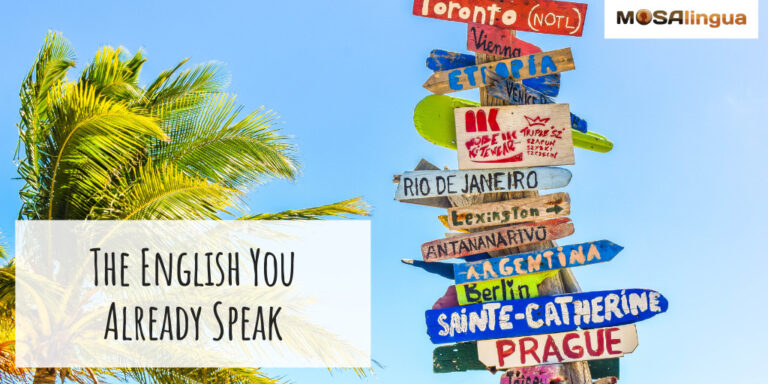When you’re first starting to learn a language, or if you haven’t quite reached fluency yet, it’s not unusual to feel like you don’t have the vocabulary to express yourself. But if you think about it, you probably know a lot more English vocabulary than you think! In fact, many languages feature common words that are strongly influenced by English, or straight English loanwords. Today, we’re going to take a quick trip around the world to have a look at some of the English words that have been adopted into various other languages.

What’s inside…
Common English Words in Other Languages
The use of English words in daily life is a phenomenon in many countries where English is not an official language. In fact, the opposite is also true. I’m sure you’ve heard an English speaker say “bon appétit” or “sayonara.” But today, we’ll be focusing on English and the vocabulary it shares with different languages around the world.
For example, I live in Brazil right now, where the official language is Portuguese. I often hear Brazilians using English words, though pronounced very differently. Sometimes, they have no idea that the word or phrase they’re using comes from English. Once, a Brazilian friend told me that she didn’t know any English. It was toward the end of November, close to Black Friday. So I said: “Yes, you do – you know at least two words!” She was shocked when I explained that “blecky Fraid” (that’s how “Black Friday” is pronounced in Brazil) were English words!
Below, you’ll find examples of some of the most common and/or funniest English loanwords in some of the languages spoken by our team here at MosaLingua.
English words in French
In many countries, including France, “Anglicisms” are considered to bring a touch of modernity to the language. In France, some of the most common words borrowed from English include:
- OK
- cool
- fun
- weekend
- parking
- camping
- lifting
- best-seller
- jean
- brushing (this actually refers to a blow-out hairstyle, not just brushing your hair)
- design
- vintage
- clown
- smoking
- pickpocket
- babysitter
- feeling
- flirt
- discount
- gloss
- challenge
- cowboy
- speed.
Interestingly, there are also several food-related words that have been adopted, like:
- steak
- toast
- brunch
- chewing gum
- barbecue.
English words in German
The French are not alone! The German language has also taken several common English words and made them their own.
For instance:
- lifestyle
- fair
- clever
- park
- ticket
- service point.
There are also many professional and technology terms, like:
- job
- manager
- meeting
- antivirus
- computer
- laptop.
Not really what you’d expect to hear in an office building in Germany, is it?
Start improving your English today

Good news: we can help!
More good news: you can get started for free! With your free trial, you can test drive the most effective method for learning English for the next 15 days!
Vocabulary flashcards, videos with subtitles, audiobooks, articles adapted to your level – with MosaLingua Premium (Web & Mobile), you’ll have access to all this and more. Get started right now. It’s free—and risk-free—to try!
English words in Polish
Next door to Germany in Poland, you’ll also hear people talking about their plans with words like:
- drink
- weekend
- lobby.
But pay attention to the spelling of the English words you hear. The Polish have creatively adapted many words to reflect Polish pronunciation and spelling patterns:
- biznesmen (businessman)
- flesz (flash)
- forhend/bekhend (forehand/backhand)
- lider (leader)
- mecz (match)
- tost (toast).
English words in Chinese
On the other side of the planet, the Chinese language has adopted words from English, as well:
- hi
- hello
- bye-bye
- party.
And the word “cool” is so popular in Chinese that it now has its own character ( 酷 ). Young people in China often use the phrase “nobody cares,” and the word “low” is used to refer to someone or something with no class!
English words in Spanish
The Spanish also use lots of English loanwords, particularly at work:
- community manager
- team building
- startup
- sponsor
- ranking
- newsletter.
But you can also hear English sneak into everyday language: “Vamos al cíber?” (cyber cafe) = (Are we going to the cyber café?). Or maybe you’re more in the mood for “happy hour” at the bar.
English words in Italian
In Italy, it’s popular for young people to say:
- bro, sis (brother/sister)
- social media
- gossip
- lifestyle
- community
- location
- influencer.
But older generations use English words, too:
- trend
- mood
- boss
- break
- hotel
- cheap
- escalation
- stress
- story-telling
- partner.
English words in Russian
Depending on where you are, you can hear a lot of English in Russia these days. Did you know that Russians often say “hello” or “sorry”? Other common English words are:
- summit
- briefing
- hitchhiking
- retail
- brand
- handmade
- startup
- copywriter
- co-working.
And similar to the Poles, some words have been adapted to fit Russian patterns: in human resources, instead of “hunt” Russians say хантить (hántit’), and “to google” becomes гуглить (gùglit’).
English words in Brazilian Portuguese
As I mentioned at the beginning, we have “Black Friday” and other words like:
- air fryer
- show (this means that something is cool)
- pet shop
- personal trainer
- home office
- homeschooling
- bullying.
(Almost) universal English words abroad
And to finish this article, we’ll have a look at a few lists of English words that are used (almost) universally abroad. First, we have:
- kit
- airbag
- outlet
- check up
- sexy.
Food-related words:
- fast food
- sandwich
- popcorn
- hamburger.
Technology and media-related words:
- Web
- download
- screenshot
- chat
- cloud
- post
- login/logout
- playlist
- bug
- spam
- smartphone
- pen drive
- fake news
- selfie
- hashtag
- like
- followers
- influencer.
Work-related words:
- freelance
- marketing
- business
- feedback
- planning
- coaching
- burnout
- networking
- meeting
- workshop.
Sports-related words:
- football
- match
- corner
- bodybuilding
- leggings
- fit
- fitness
- bowling
- skate
- surf
- bike
- CrossFit
- PR (“personal record”)
- strength
- freestyle.
And finally, entertainment-related words:
- casting
- spoiler
- interview
- box office
- shooting
- making-of
- remake
- best-of
- star
- show
- fan
- best-seller
- playback
- DJ
- jet set.
WATCH: The English You Already Speak
Don’t have time to read the article? Not sure how to pronounce some of the words listed in it? No problem! The video version is available below. It’s in English, but subtitles are available in French, German, Italian, Portuguese, and Spanish. Click on the gear icon at the bottom right of the video to turn them on.
You can also watch this video (and lots of others) on our YouTube channel.
Don’t forget to subscribe to our YouTube channel for more language-learning videos!
Learn about English abroad via podcast
Listen to “#73 – The English You Already Speak” on Spreaker.




Comments